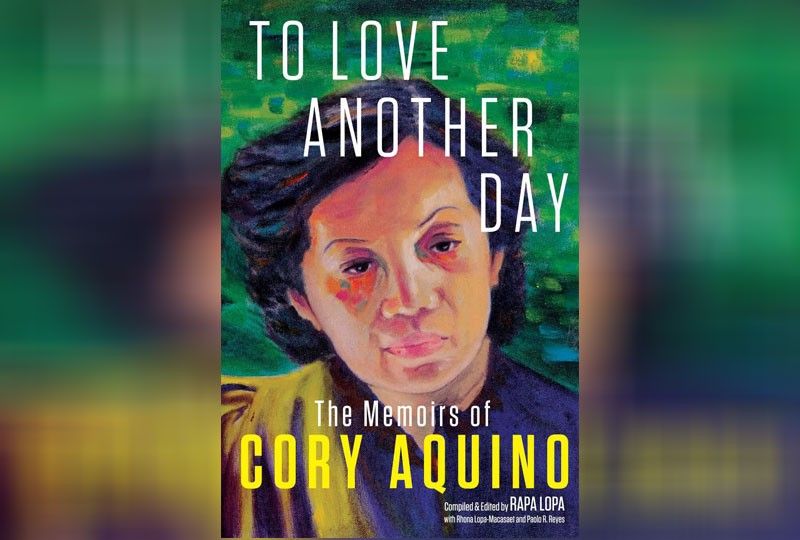God had other plans

MANILA, Philippines — (This chapter is part of the book “To Love Another Day,” a compilation of the former president’s unpublished memoirs, as gathered by her nephew Rapa Lopa. It will be released today, on what would have been Ninoy Aquino’s 87th birthday.)
It is true, to a certain extent, that our fate is in our hands. We make choices, commit acts, speak words that decide the direction our lives should take. And yet, on occasion, events intrude of which we have no control and our plans go awry, our lives drastically change. It was that way with Ninoy and me.
Before Sept. 23, 1972, it seemed that there was nothing that he could not handle. He had planned his life and everything was going on schedule. At that time, the important event he was most looking forward to was the forthcoming presidential elections of 1973.
However, God, I guess, had other plans for him.
On the evening of Sept. 23, 1972, president Ferdinand Marcos declared martial law. It was a grim-looking Kit Tatad, information minister, who made the announcement on TV. Marcos had signed Proclamation 1081, a proclamation that was in reality signed as early as Sept. 21, but was only made public two days later.
In the weeks before, there had already been rumors of martial law. And in the hushed and secret conversations among the citizenry was an undercurrent of dread, a dread that was made real on that evening of Sept. 23. All of a sudden, it seemed, a great shroud of silence fell all across the country. There were no commercial radio broadcasts, the screens on televisions went blank, the streets emptied. Everyone then knew what had happened, but no one knew what it meant, how lives would shift, futures be reshaped.
For us, without our being aware of it, our lives had begun to radically shift even before this announcement was made. It all began with the news on television that Johnny Ponce Enrile, Marcos’s minister of defense, had been ambushed on the evening of Sept. 22. My immediate thought was to call Ninoy at the Hilton Hotel, where they were conducting the last meetings of the Committee on Tariff, of which he was a member. When I spoke to him, I expressed my concern that the authorities might pin the blame for the ambush of Enrile on him.
Then, on Sept. 23, with the day just beginning, I received a call from Ninoy. He informed me that he was on his way to Camp Crame. I was perplexed because he could not tell me why, but he assured me that I would know eventually.
Later, I received a call from Judy Roxas, wife of Sen. Gerry Roxas. She asked me if I knew what had happened to Ninoy. When I told her no, she informed me that Sen. John Osmeña had just called from the Hilton. Martial law had been declared, he said, and Ninoy had been arrested. Judy also said that Gerry was on his way to Crame and would call us once he got to see or talk to Ninoy.
I woke my children up (at that time Kris was only a year and a half old) to tell them what had happened; and when I told them, I couldn’t help but cry.
I remember the flurry of phone calls that followed, calls from people greatly worried, like my sister, Terry, and her husband, Baby Lopa, who asked me what I planned to do. I also talked to my brother, Peping, who suggested that we move out of our house in Times Street, Quezon City, and to our parents’ house in Forbes Park, Makati. Monching Mitra also called and asked me where Ninoy was. When I told him that Ninoy had been arrested and brought to Crame, Monching knew his own arrest was coming. Apparently, his dogs had been barking and, true enough, soon after there were the military to pick him up.
Gerry, who had gotten back to his house at about two-thirty in the morning, called next. He had gone to Crame to see Ninoy. He said that Ninoy had also suggested we move out of the house in the meantime.
Stopping first at Gerry’s house in Cubao, I asked him whether or not I could visit Ninoy that day. He could not give me an answer, but encouraged me to try. In Gerry’s house at that time was Chino Roces. Nap Rama may have also been there. They were biding their time, waiting to be arrested, certain that the military would come for them soon. In fact, Pacita Roces, Chino’s wife, had earlier warned Chino not to come home. The military had already been to their house looking for him.
My children and I then proceeded to my parents’ house in Forbes. As we made our way there, I thought how everything seemed so strangely calm and peaceful. There was nothing on the radio except music, and I thought, No one knows what is going on.
When we got to Forbes, Baby and Terry were already there, as well as another sister, Passy Teopaco, who lived with my parents then. We were all quite at a loss what to do, not knowing from whom to seek help or even any bit of information. I remember calling Joe Roxas, a friend of Ninoy’s, to inform him about Ninoy’s arrest and ask if he could help. I told him, “Kinulong na si Ninoy.”
Needless to say, sleep was impossible. I must have gone to sleep around three o’clock or four o’clock in the morning. I would retreat to the bathroom and cry. I had no inkling what was going to happen: What was to become of Ninoy? What was to become of my children and me?
Then at six that morning, Tessie Oreta, my sister-in-law, called to offer to accompany me to Crame. She had already been there before and had experience with this sort of thing, when her husband Len Oreta was arrested and detained during the suspension of the writ of habeas corpus.
In Crame, after introducing myself to the authorities there, Tessie and I were brought to what looked like the camp’s gymnasium. I was told that I would not be allowed to speak to Ninoy, only to wave at him. When I finally saw Ninoy, we waved at each other, as instructed, and that was it. Tessie and I were then led away.
Back in Forbes, Lupita Kashiwahara, another sister-in-law, told me that Preciosa Soliven, the wife of Max Soliven, had been able to get permission from Gen. Eddie Ramos to visit Max, and that perhaps I could ask for the same.
When I was finally granted the visit, Ninoy told me that he and the others were going to be transferred to Fort Bonifacio. The following morning, a Sunday, Nena Diokno, wife of Sen. Pepe Diokno; Toto Locsin, wife of Teddy Locsin Sr.; Pacita and I went there to inquire about the procedures for visiting our husbands. Finally, we were allowed to see them that same day.
Before going in to see our husbands, we had to be bodily searched by WACS (Women’s Auxiliary Corps). The whole experience was so absolutely new and unsettling. At that time, I was in a state of disbelief: how unbelievable it was that these things could happen or be done to a senator, publishers of a newspaper and a national magazine. Imagine what they could do to ordinary people, the anonymous common folk, who wield neither influence nor power.
Still in the beginning, things did not seem too bad. We could visit every day for an hour, although there was always a WAC and a military soldier looking on.
At that time, Ninoy and the others did not think that the worst had happened yet. The situation was still tolerable for Ninoy because at least they were all together. Besides him, there were Pepe, Soc and Monching, the senators; Chino and Teddy, the publishers; Max, Jose Mari Velez and Nap, the columnists; and Voltaire Garcia, a student activist.
As they tried to adapt as best they could to prison life, they shared chores, taking turns washing the dishes and doing other mundane tasks. Sometimes, a psychologist came to talk them. I doubt, however, if he was of any help to them at all because, for one, Teddy absolutely refused to talk to him. And Chino, when he did, “confided” to him such things as how he was falling in love with the goats roaming around Fort Bonifacio. Ninoy, on the other hand, always welcomed the opportunity to talk.
Soc had his very own nightly ritual as well. Every night, he would make it a point to bathe with a tabo (dipper) and change into a clean shirt. They found this a source of amusement and always teased him, asking, where are you going?
Soc had also suggested that they pray the rosary every night. It was he, in fact, who taught Ninoy the Glorious mysteries. And so they took turns leading the rosary every night.
The thing that struck me most about Soc was his serenity. For this is what I observed about him, that, in spite of the predicament they were in, he had this air of calm about him. Confined to their cells, amid all that restless energy, the speculations, the worries, he seemed nonetheless to radiate an inner peace. Soc really had a good influence on all of them because of that inner peace.
If Soc was their religious instructor, Teddy was their resident poet. He was well-versed in poetry and gave them lessons on it. But most of the time, of course, they discussed politics and when they were going to be released. Ninoy, as early as then, volunteered to them that he felt he would be the last of them to be released.
It was, I imagine, an unusual and very interesting setting, where all of them were more or less intellectually compatible and so could carry on discussions about everything under the sun. Between the mysteries of the rosary, the elements of poetry and the all-consuming topic of politics, the exchange of ideas must have been very stimulating.
At the same time, however, it also spelled a total change in their lives. Here where some of the country’s most influential people all at once made ineffective under the complete control of the military authorities. Yet the situation also enabled them to get to know each other better. Without the trappings of their powerful positions, suddenly they were all on the same level. Thrown together, as they were, for 70 days, they became familiar with each other’s quirks and habits, as well as points of character, good and bad.
Then on Dec. 1, 1973, Chino, Teddy and Nap were released, and two more were released on Dec. 4.
As it turned out, Ninoy and Pepe were to be left behind in jail.
- Latest
- Trending






























